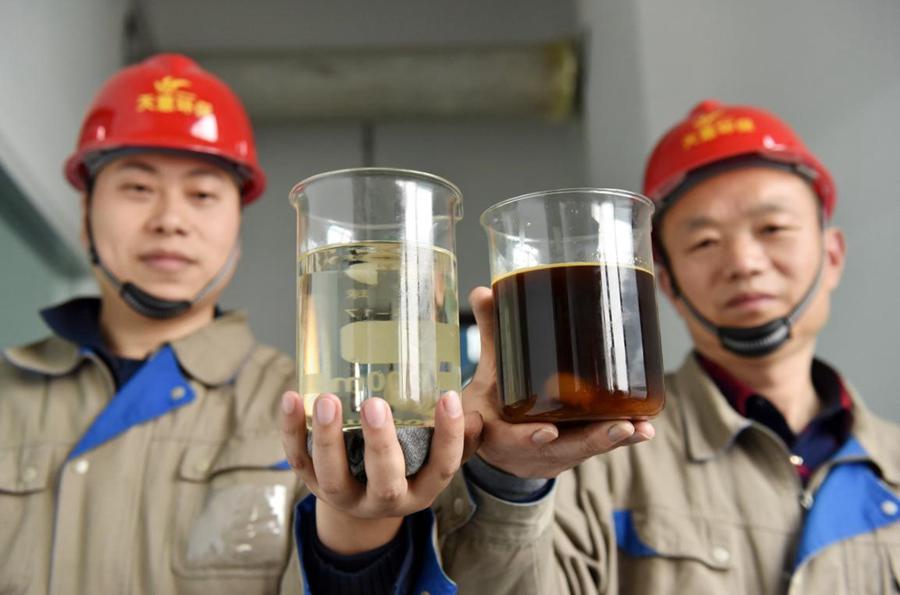Shanghai fuels buses with biodiesel made from 'gutter oil' (3)
 |
| Two technicians of Anhui TianYi Environmental Protection Technology Co., Ltd. based in Chaohu, east China's Anhui province, show a biodiesel sample (left) that has met relevant standards and a sample of unprocessed waste cooking oil (right) that is used to produce biodiesel, Dec. 16, 2019. (People's Daily Online/Ma Fengcheng) |
East China's Shanghai municipality processes "gutter oil," or cooking oil recycled from kitchen waste, into biodiesel through technical means and makes it a power source for buses.
In May 2019, Shanghai Jiushi (Group) Co., Ltd., a public transport operator in Shanghai, teamed up with Sinopec Shanghai Petrochemical Co., Ltd. and started using B5 biodiesel, a blend consisting of 5 percent of biodiesel processed from "gutter oil" and 95 percent No. 0 diesel, on over 2,000 buses.
As of the end of December 2020, buses of four companies affiliated to Shanghai Jiushi (Group) Co., Ltd. had been fueled for 820,000 times by a total of 50.85 million liters of B5 biodiesel.
In fact, Shanghai already overcame the technical difficulties of turning "gutter oil" into biodiesel more than a decade ago. However, it was not easy to bring "gutter oil" from lab to the market and make it accepted by the public.
Before the biodiesel was officially introduced to buses, a number of tests had been carried out to dispel concerns, such as whether biodiesel would damage automobile engine, if it is enough to power a vehicle, and whether the exhaust emissions of vehicles using biodiesel could meet relevant standards.
On Sept. 29, 2013, a subsidiary of Shanghai Jiushi (Group) Co., Ltd. first piloted biodiesel on a bus. To ensure the normal operation of the vehicle, the group assigned workers to test the quality of biodiesel, collect and analyze refueling data, and track and maintain the bus every day.
Tests conducted by Tongji University in Shanghai on the actual working conditions of buses using biodiesel revealed that after using biodiesel, these vehicles have seen obvious improvement in their exhaust emissions, and that no carbon deposit was found on the surfaces of key parts of these buses switching to biodiesel, including the top of the piston, air valves, as well as oil atomizers. In addition, these buses didn't experience malfunction related to oil-way during the tests.
By the end of 2020, B5 biodiesel for automobiles had maintained a 100-percent pass in all quality spot checks conducted by national authorities and various quality supervision departments of Shanghai.
Facts have proven that the B5 automotive biodiesel can help reduce the emissions of heavy metals, fine particulate matters, as well as polluting gases by more than 10 percent, and cut the amount of oxynitride emissions by as much as 80 percent.
Statistics have shown that in recent years, the amount of discarded kitchen oil produced in Shanghai has stood at more than 30,000 tons each year. Since 2013, the city has rolled out many policies to standardize various links of the recycling of discarded kitchen oil, including the collection, transportation, and disposal of the oil, as well as the promotion and application of such oil in petrol stations.
The city has formed a complete system for the recycling of waste cooking oil, which realized closed-loop management of the whole industrial chain, price linkage, subsidy guarantee for relevant activities, and smooth application of products.
Today, Shanghai is able to make sure that it basically recycles all the discarded kitchen oil in the city that can be possibly recycled and reused.
The city is now home to 18 recycling companies, which collect waste cooking oil from catering businesses of the city at fixed locations every day.
After weighing the "gutter oil", staff members of recycling companies upload data onto a backstage management system.
Following rough processing, the discarded kitchen oil collected from restaurants is transported to a specialized company for preliminary treatment, esterification reaction, distillation, and refinement, and then eventually becomes biodiesel after extraction and purification.
Because of the relatively high cost of the collection and transportation of waste cooking oil, Shanghai formulated an emergency guarantee mechanism to offer subsidies to relevant companies disposing such oil or selling biodiesel made from it, in a bid to ensure the normal operation of these companies and promote the large-scale utilization of the biodiesel.
According to Sinopec Shanghai Petrochemical Co., Ltd., the retail price of B5 biodiesel per liter has been kept at 0.3 yuan (about $0.05) cheaper than that of No. 0 diesel since it was launched. For instance, a fleet of 30 sanitation vehicles can save more than 100,000 yuan on fuel if they switch to B5 biodiesel.
As of the end of December 2020, Sinopec Shanghai Petrochemical Co., Ltd. had made B5 biodiesel available for consumers at 243 of its petrol stations, and about 14 million vehicle-times of cars had been refueled with B5 biodiesel.
 |
Photos
Related Stories
Copyright © 2021 People's Daily Online. All Rights Reserved.










